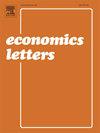Optimal monetary policy under fairness concerns in pricing
IF 2.1
4区 经济学
Q2 ECONOMICS
引用次数: 0
Abstract
This study explores the implications of fairness concerns in pricing for optimal monetary policy. Building on the fair-pricing model of Eyster et al. (2001), it derives a utility-based welfare loss function and identifies two key findings. First, fairness concerns shift the policy objective from stabilizing inflation, as emphasized in New Keynesian models, to minimizing and stabilizing perceived unfairness. Second, the analysis uncovers a novel disinflationary bias under discretionary policy, which contrasts with the inflationary bias widely discussed in the literature.
求助全文
约1分钟内获得全文
求助全文
来源期刊

Economics Letters
ECONOMICS-
CiteScore
3.20
自引率
5.00%
发文量
348
审稿时长
30 days
期刊介绍:
Many economists today are concerned by the proliferation of journals and the concomitant labyrinth of research to be conquered in order to reach the specific information they require. To combat this tendency, Economics Letters has been conceived and designed outside the realm of the traditional economics journal. As a Letters Journal, it consists of concise communications (letters) that provide a means of rapid and efficient dissemination of new results, models and methods in all fields of economic research.
 求助内容:
求助内容: 应助结果提醒方式:
应助结果提醒方式:


